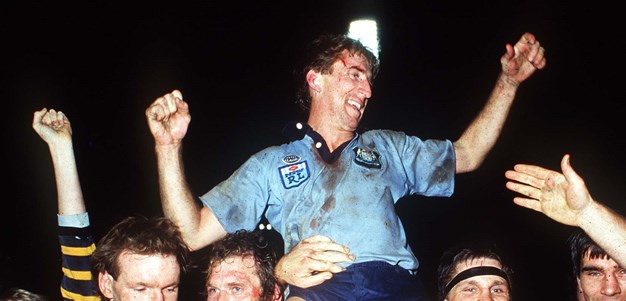2003-2005: Modern Legends

The second drawn series in four years led to another first in State of Origin football: golden-point extra-time. Now a part of every NRL regular-season game if scores are level after 80 minutes, the concept had been first used during the Super League’s Tri-Series, with NSW defeating Queensland 23-22 in the decider. Given the Maroons had retained the shield on both occasions the official series was drawn, many north of the border opposed the new rule – but it was introduced nonetheless.
Another sub-plot in the lead-up to 2003 series was a dynamic between NSW coach Phil Gould and captain Andrew Johns, both of whom had retained their positions. Gould, who had been publicly critical of Johns’ early-season club form, was perceived to have caused a rift between himself and the Newcastle halfback, but this was soon denied by Johns as he remained focused on the task at hand.
Playing for the Blues and winning an Origin series offers a player enormous satisfaction, achievement and pride. This year will be no different to others.
Andrew Johns 2003
Returning to a newly-developed, 52,000-capacity Suncorp Stadium, the series opener presented a new challenge for the Blues, with the atmosphere of ‘the Cauldron’ amplifying Queensland’s long-held hostility. It didn’t stifle the New South Welshmen, however, as they saw off a mostly close and highly-entertaining contest to win 25-12.
Despite the intense spotlight, Johns performed exceptionally in the Blues’ Game One victory – and he took it to another level in Game Two. In a lacklustre showing from Queensland, Johns earned Man-of-the-Match honours as NSW rose to a 27-4 rout at Stadium Australia – then known as Telstra Stadium. The Blues won back the shield, thanks largely to the previously-criticised NSW and Australian captain.

With the series won, Queensland mustered an upset 36-4 victory in Origin III at Suncorp Stadium, which featured the debut of eventual captain Cameron Smith. A year later, both sides would be forced into significant changes to their playing rosters.
Injuries to Johns, Timana Tahu, Jason Ryles and Luke Bailey compounded the retirements of Robbie Kearns and Luke Ricketson, as Phil Gould was made to usher in a new wave of NSW talent for the series opener. The night would belong, however, to one of just five incumbents: five-eighth Shaun Timmins.
Scoring a second-half individual try to get the Blues two points in front, Timmins’ services would again be required when scores were level later in the game, as State of Origin entered golden-point extra-time for the first time. Two minutes into the additional period, Timmins sent a powerful 37-metre field goal over to secure one of the more memorable NSW victories in Origin history.
The jubilation of the Blues’ Game One triumph was short-lived, with several forced team changes ensuring a new-look contest in Game Two. The Blues had particular difficulty in finding halves; after incumbent Craig Gower was injured, Brett Kimmorley and then Matt Orford were both named before suffering the same fate, while Trent Barrett declined the opportunity.
Eventually, Gould settled on Roosters’ No.7 Brett Finch – while his halves partner was an easier choice. A conversation between Gould and long-term friend Brad Fittler convinced the then-32-year-old to make a return to the representative arena, having previously retired on a disappointing note in the 2001 series defeat.
It most probably comes down to one game of footy where I can change the past and hopefully make it a better ending.
Brad Fittler 2004
The return was initially an unsuccessful one for Fittler, with his side going down 22-18 in a game often remembered for an entertaining chip-and-chase try to the Maroons’ Billy Slater. When a highly-anticipated, sold-out series decider at Telstra Stadium arrived, Fittler would get his fairytale.
In a game in which Queensland failed to capitalise on early opportunities, NSW did the opposite; trailing 8-6 late in the first half, they managed to pile on five more tries to convincingly win 36-14. The highlight of this for NSW fans was the sight of Fittler, set to retire after a decorated 16-year career, racing away for the state’s final try after charging down a Darren Lockyer kick. It sent Fittler – and Gould, who was also set to step down from Origin duties – out as deserved winners.

The loss of Fittler was a significant one ahead of the 2005 series, while injury denied Johns’ availability for consecutive years. In the second-straight series opener decided by golden point, the Blues looked to have missed their experienced playmakers; halfback Brett Kimmorley's extra-time intercept thrown to Queenslander Matt Bowen handed him the match-sealing try. It resulted in exaggerated public criticism for the NSW halfback and capped the 24-20 defeat.
Having overcome injury, Johns was the big inclusion for NSW in Game Two, replacing Kimmorley – and what followed can be considered one of the most dominant individual displays ever seen in Rugby League. The clear Man of the Match, Johns was instrumental in the 32-22 defeat as the Blues levelled the series.
It set up another mouth-watering decider in Brisbane, which would be Johns’ representative swansong. As Fittler did a year previously, the eventual Immortal engineered another 32-point attacking masterclass from NSW, conceding just two tries. The Blues retained the shield and Johns became another NSW legend to be afforded the appropriate farewell.
While the three consecutive series wins represent one of the state's strongest periods in the Origin era they were to be the last victories enjoyed by the state in some time.


New South Wales Rugby League respects and honours the Traditional Custodians of the land and pay our respects to their Elders past, present and future. We acknowledge the stories, traditions and living cultures of Aboriginal and Torres Strait Islander peoples on the lands we meet, gather and play on.



